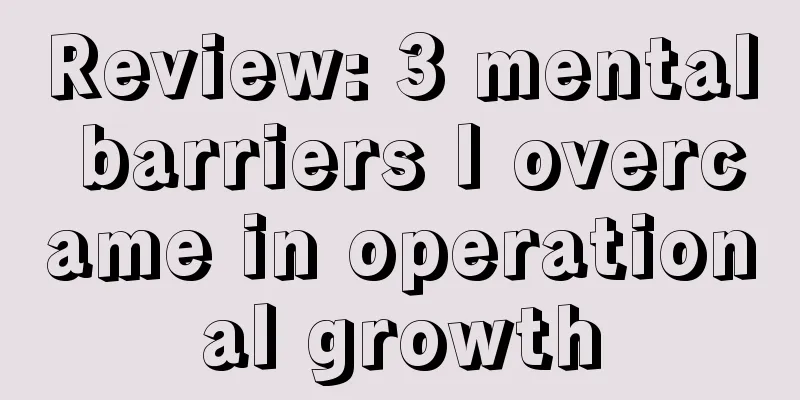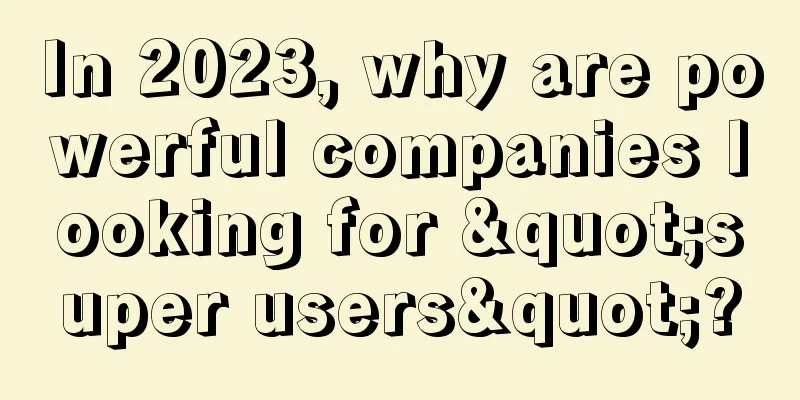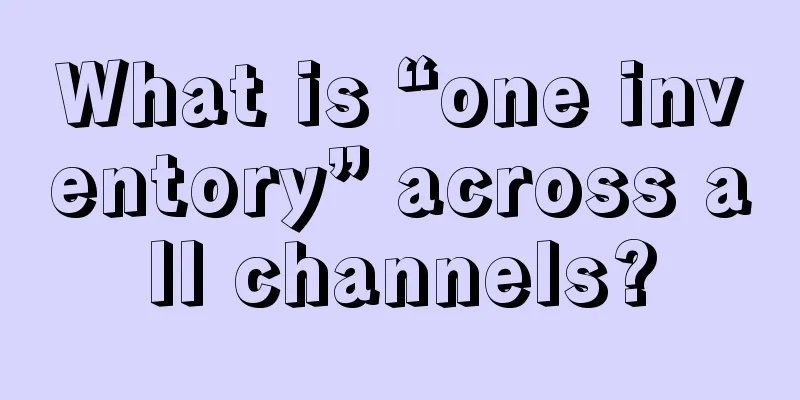Review: 3 mental barriers I overcame in operational growth

If I hadn't had these struggles back then, maybe I would have grown faster! The reason why I have such a feeling is that I found that on the road of growth, there are several thoughts that have trapped me. It is their existence that caused me to be constantly entangled and internally consumed when doing operations, and to be indecisive when making decisions. Now that I have passed this stage, I want to share it, hoping it can help you avoid pitfalls. They correspond to three questions:
1. Is operation user-centric or business-centric?Business-focused. Why is this the answer? Because your identity, position, and interests as an operator are all given by the business. Some people say, isn’t it because we have identified the user needs that we build our business on this basis? Yes, but the company has to make a profit and you have to serve the business's revenue goals. To achieve revenue goals, we need to provide services that meet user needs and that users are willing to pay for. The demand here is limited. You cannot give up your bottom line and serve users regardless of cost just because users give you positive feedback and bring you a sense of accomplishment. The final result may be that you move yourself and your users, but the company does not make money, so the knife of layoffs is swung at you. In addition, users who give you positive feedback may not necessarily represent all target user groups. For example, when doing community operations, we will formulate operating methods based on the users who express their willingness. In fact, these people are a minority, and the majority are silent. When formulating operational strategies, we should not only listen to the expressive users, but also explore the needs behind the silent users. Otherwise, according to the proportion, in a group of 100 people, 10 are active, but your operation method revolves around these 10 people. When only 3 of the 10 are active, then you have changed your operation method to serve 3 people. This obviously takes you away from "real" user needs. Your target users should be those who have a need for the services you provide and are willing and able to purchase them. We need to understand the relationship between the business-centric perspective and the user-centric perspective. From a business perspective, once there is a profit to be made, we must reap as much as possible ( revenue ); from a user perspective, all needs must be met as much as possible ( cost ). If we over-exploit users, we will lose them; if we over-serve users, we will not be able to make ends meet. The two are in a mutually reinforcing relationship, and the whole process has a life cycle. It either ends in resource exhaustion or user loss. But overall you have to ensure that commercial interests outweigh user interests, otherwise it will not be sustainable. A while ago, I saw a clip from the movie "What My Boss Doesn't Know About Me" in which a boss said: The salary increase your company gives you is essentially a price you pay so that you won't leave. For users, commercial organizations also provide a value that users will not leave, and more importantly, they maximize their profits. It may not sound good, but if you think about it carefully, it does make sense. 2. How to view short-termism and long-termism?When we say the word "long-termism" , in the eyes of many people it represents a down-to-earth and progressive attitude. When we say the word "short-termism" , in the eyes of many people it is synonymous with quick success and short-sightedness. 1. Short-termism tests your ability to seize opportunitiesIn fact, we see many speculators making money around us. This is because many opportunities are fleeting and if you don’t seize them, you will miss them. Behind all the money that can be made from speculation, there is a prerequisite, which is that you have the ability to seize it. At least this includes "the ability to identify opportunities" and "extremely strong execution ability." I don’t know if you have ever thought about this, but basically scammers work harder and have better execution than you. 2. Long-termism means you have the ability to make choices based on your own valuesA person with consistent values is definitely someone worth making friends with and following, but being able to make choices based on values requires extremely high abilities. It's just empty talk about long-termism, just like when you are in a company, your boss paints a rosy picture of going public for you. They always tell you not to care about the temporary salary and to work harder. But when performance doesn't improve significantly in the short term, they will turn around and say goodbye to you. This is the reality. I don’t believe that if a person who doesn’t even earn 100 yuan tells you that you can earn a million yuan a year by learning from him, I won’t believe it. Therefore, I believe that short-term skills need to be developed so that in the long term you will be able to act in accordance with your values. For example, when it comes to making quick money, you have to grab the opportunity when it comes. Because you seize opportunities again and again, your business sense will be exercised and you will be able to choose long-termism. Otherwise, long-termism will become a fig leaf used by those who cannot make money to numb themselves. If you want to achieve something in a field, you need to exercise your abilities and accumulate resources through some short-term opportunities, so that you can eventually make long-term choices based on your own values. 3. How to decide whether to stick to something?There are actually two points here:
What we are actually considering here is necessity, that is, whether there are benefits and risks in doing this. My opinion on this is that after analysis, we can see the long-term value of this matter, and this long-term value is what you need, so let's do it. 1. About whether to persist or not?Generally people have two mindsets: (1) All-in mentality My opinion is that if you don’t have the capital and go all in at every turn, this kind of gambling mentality will easily lead to total loss. (2) Try it out For example, if you write a few articles, make a few videos, and then expect to create a hit right away, the probability of this happening is really too low. I have actually had both mentalities, but what supports me now is the third one, which is "rational normal mind" . What does it mean? After I know clearly what I want to do, I am not afraid even if I go through the "black hole period". I am still willing to continue to optimize. My understanding of the "black hole period" here is: There will always be a period when you put in all your efforts but receive no feedback, whether it is positive or negative, and you don’t know how long this period will last. Things that seem easy to others may require all your strength just to move a little, and you may fall into self-doubt from time to time. 2. What should we do in the face of such a situation?(1) Analyze your motivation for doing this What is the original reason for you to do this? If it is to become rich and powerful, this is called delusion. If you gain some knowledge and experience through doing something and learn to make money, this is a rational result. (2) Think about which of these have extremely high certainty of value. As time goes by, the parts you can’t grasp will become fewer. At the beginning, it must be broken, immature, and even unwatchable, but you can find corresponding ways to improve it through review. The risks and benefits of doing this are that there is no risk, but the benefits are unclear. Although the benefits are unclear, there is indeed a good possibility. (3) Be patient. It is not about insisting on doing something, but about doing it continuously. If you need to make up your mind to stick to something, it is likely to be painful. Making it a daily routine is the highest level of persistence. Don't focus too much on the goal and become a slave to it. (4) Facing other people’s comments or suggestions Whichever is better, give way to the reason that gives you priority to take action. Trust your first instinct. The above is today’s content sharing, I hope it will be helpful to you. Author: Zhizhong WeChat public account: Shixian Operation (ID: yyshixian) |
<<: 4 dark horses + 5 trends: Check out the most profitable live streaming rooms in 2023
>>: How will AI change the future of marketing and sales?
Recommend
How many core keywords can I write for Amazon? How to write them?
Many friends have their own stores on Amazon. So, ...
From "self-development" to industry explosion, the nine new business ecosystems of the second dimension
With the booming development of ACG culture, this ...
With millions of paid members and a repurchase rate of up to 60%, what makes "Super Monkey", the new darling of the fitness industry, keep users paying for it?
Fitness is a hot demand nowadays. As a fitness bra...
Millions of young people who are trying to be poor are being "harvested" by the 9.9 yuan meal package
Unconsciously, the trend of "poor man's m...
How many main images does Amazon have? What are the requirements?
Many merchants will open stores on the Amazon plat...
On sale today! No pre-sale during 618, big changes for e-commerce platforms
E-commerce platforms collectively cancel pre-sales...
How to cultivate the data thinking favored by big companies
Data thinking is not simply a data analysis skill,...
After reviewing the case in March, I have a new understanding of holiday marketing
This article shares new thoughts on festival marke...
Haidilao enters campus: the winning strategy of "intercepting flow" thinking
Recently, Haidilao's presence in campuses has ...
Is cross-border e-commerce a scam? What are the advantages?
Now, many friends still have some difficulties in ...
The secret of a 30% viral article rate: Xiaohongshu's popular article topic selection SOP
Whether it's strategy or playing style The mos...
Brand upgrade: How can brands sell at a higher price and sell more?
Generally speaking, brands are likely to encounter...
How to sign up for Amazon Prime Day? How to increase the chance of getting approved?
The specific time of Amazon Prime Day has not been...
Amazon holds Prime members' early access day to save sluggish sales
In order to boost sales, Amazon has a new way. Thi...
Avatars that make leaders lose the desire to communicate: Find yourself behind thousands of avatars
Faced with stressful work, the mentality of worker...









